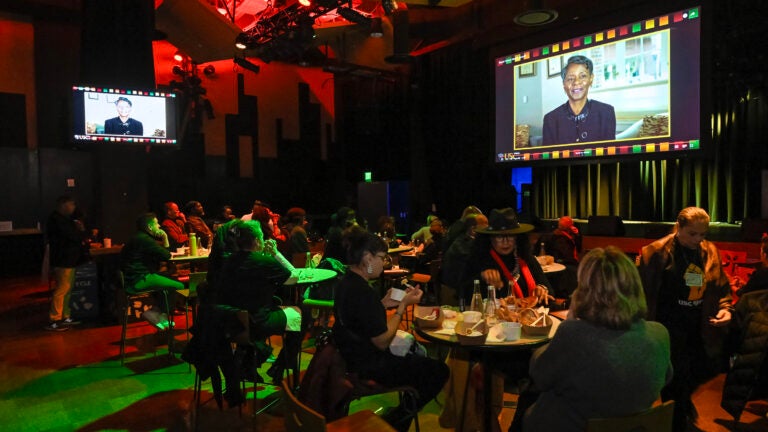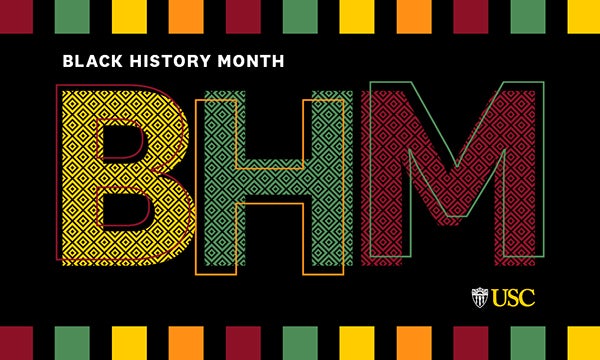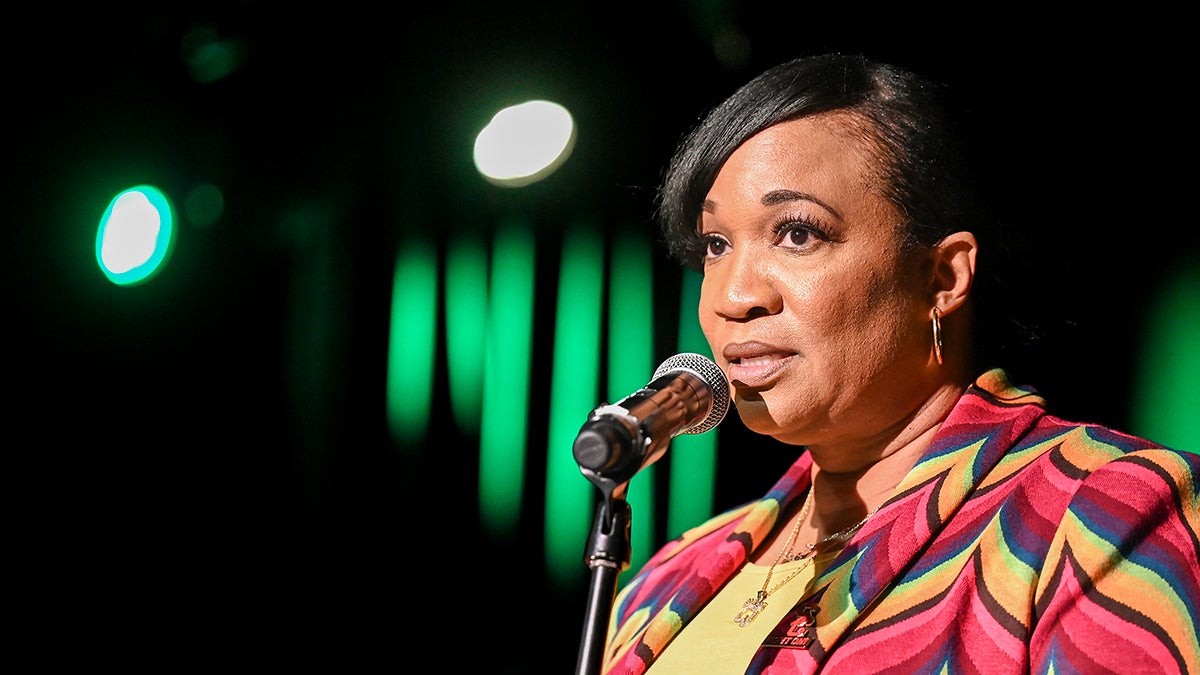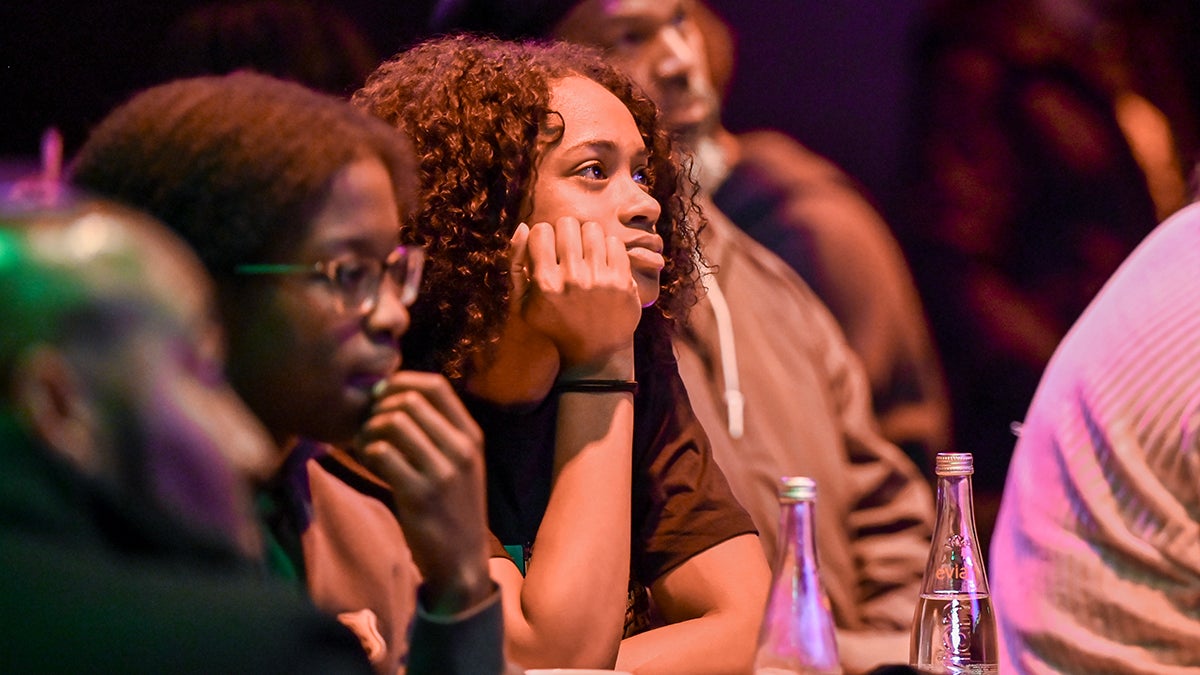
Thursday’s Black History Month kickoff event featured a mix of virtual and in-person presentations. (USC Photo/Gus Ruelas)
USC kicks off Black History Month with a thoughtful celebration of excellence in the arts
More than 150 Trojans gather inside Tommy’s Place on the University Park Campus for live and virtual presentations.

When Nickey Woods took the stage at USC’s Black History Month kickoff event on Thursday, the first name she mentioned to the crowd was that of Carter G. Woodson, the scholar born in 1875 who fervently believed that Black people should be proud of their heritage. It was this child of two formerly enslaved parents who initiated the first Negro History Week in February 1926.
“His vision was clear, but his expectations were modest,” said Woods, the USC Gould School of Law associate dean for student affairs, diversity, inclusion and belonging. “He could not have envisioned the profound impact and enduring legacy that would grow from his efforts.”
Fifty years after it began, Negro History Week caught on to such a degree that it became the nationally recognized Black History Month in 1976.

Woods spoke powerfully as she shared why she believes Black History Month events are “imperative” on college campuses, where the hearts and minds of future leaders are “nurtured and challenged.” She said college is a time when perspectives can be reshaped and futures redefined.
“These programs provide a space for dialogue, understanding and mutual respect,” Woods told the crowd of more than 150 people gathered inside Tommy’s Place on the University Park Campus. “They remind every student that, regardless of their background, the fabric of this nation is woven with diverse threads, each indispensable and each irreplaceable.”
Woods’ live remarks were followed by a virtual program featuring students, faculty, staff and community members speaking on this year’s theme of “Empowering Excellence: Celebrating Black History through the Arts.” The virtual program, livestreamed online, also included a performance by the Cardinal Divas of SC, a team of Trojan majorette dancers founded in 2022 by USC School of Dramatic Arts senior Princess Isis Lang.
Impact of Trojan alumni in the arts
USC Senior Vice President of Human Resources Felicia A. Washington spoke about the influence Black Trojans have had on the arts, and paid tribute to the contributions of such USC alumni as actress Denise Nicholas, television producer Shonda Rhimes, the late filmmaker John Singleton, Tony Award winner Renée Elise Goldsberry, Grammy nominee and USC faculty member Patrice Rushen and composer Paul Milton Jackson Jr., among others.
“As a community, we don’t have to look far to see the influence of Black arts in our society and USC’s history,” said Washington, who was also present at the viewing party.

USC Black Alumni Association Executive Director Jasmine Taylor said in her remarks that the arts have often been instrumental in empowering, lifting and preserving the narratives of the Black experience.
“In a world where Black voices are often silenced and marginalized, let us recognize the arts as a conduit for empowerment, a vehicle for change and a testament to the indomitable spirit of the African American culture,” Taylor said.
Other virtual speakers included state Sen. Lola Smallwood-Cuevas, USC Department of Public Safety Chief Lauretta Hill, Trojan football safety Anthony Beavers Jr., USC Suzanne Dworak-Peck School of Social Work Professor Stephen P. Hydon, USC Annenberg School for Communication and Journalism student Sade Anderson, USC Viterbi School of Engineering graduate student Mai-Yen Fritz and USC Black Staff and Faculty Caucus President Cynthia Brass.
“There are so many more men and women who have been a huge part of America,” Brass said. “I am looking forward to those up-and-coming movers and shakers and most of all, the good troublemaking people.”
Black students find community at USC
USC Thornton School of Music junior Giselle Strong was at Thursday’s event because she tries to attend as many USC Center for Black Cultural and Student Affairs activities as possible.
“What better way to celebrate Black History Month?” Strong said. “It’s a great way to build community and get to know people that you might not have seen before. I constantly learn more every day and get exposed to different perspectives.”
For USC Rossier School of Education graduate student Izzy Batiste, the month is an opportunity to showcase the different “intricacies and nuances” of the Black community.
“There’s not just one way to be Black, and we’re all a part of the same umbrella within the diaspora,” he said in an interview. “America started as a melting pot; it’s important to highlight each other and showcase what makes all of us unique and different.”
Thursday’s event was presented by the USC Office of Inclusion and Diversity, USC Bovard College, USC Athletics, USC Black Staff and Faculty Caucus, USC Black Alumni Association, USC Black Student Assembly and USC Department of Public and Safety.
Attendees were served a lunch of chicken or pulled pork sandwiches with macaroni and cheese and collard greens provided by the popular food truck Hotville Chicken.
The campuswide series of Black History Month events throughout February will culminate in a “family reunion”-themed celebration at Alumni Memorial Park on Feb. 29.



